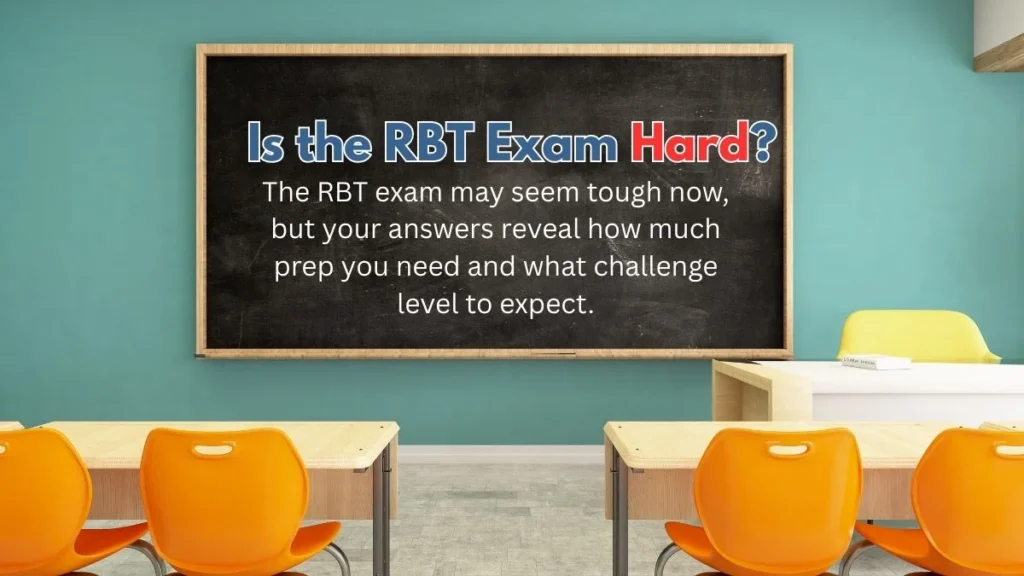Is the RBT Exam Hard? These 6 Questions Reveal Your Readiness Level

Many new candidates ask this same thing: is the RBT exam hard? The truth is, it can be hard if you don’t plan your preparation right. The RBT examination tests your real skills, not just what you remember from notes. It checks how well you can use your applied behavior analysis knowledge in day-to-day work. It’s made by the Behavior Analyst Certification Board (BACB) to make sure every Registered Behavior Technician who passes has the necessary knowledge and sense of professional conduct to work in the field of behavior analysis.
What the RBT Exam Is All About
The RBT exam is a key important step in the field of applied behavior analysis. It’s not just about theory. It’s about how well you can use the ideas of measurement, intervention, skill acquisition, and ethical professional conduct in real-life work. The exam includes 75 exam questions, and out of these, some are pilot questions that don’t count toward your score but are used for future tests.
This exam format makes sure every technician is ready for real cases. It follows the RBT Task List, which breaks down all core data, tasks, and duties you must know. If you want to pass, you must not only learn but also understand how to apply these ideas in the field.
The Real Goal Behind the RBT Exam
The main goal of the Behavior Analyst Certification Board (BACB) is to ensure that each registered behavior technician is skilled, ethical, and ready for work. This test checks your skill to follow required documentation, respect professional conduct, and handle real cases with care.
It’s not built to trick you. It’s built to test if you can follow plans, record data, and respond well when real behavior problems come up. This is why many people find it tough it demands both knowledge and dedication.
Understanding the Exam Format and Structure
The RBT exam format includes 75 multiple-choice questions. Each question has four options, but only one is right. You get 90 minutes to finish all the questions. Out of these, 10 are pilot questions used for future tests, but you won’t know which ones they are, so treat each as if it counts.
The content is based on five main domains from the RBT Task List:
- Measurement – recording and tracking data.
- Assessment – learning how to spot client needs.
- Skill Acquisition – how to help clients gain new skills.
- Behavior Reduction – how to reduce unwanted acts.
- Professional Conduct – ethics, respect, and right actions.
Common Mistakes That Cause Failure
One big mistake is not linking theory to practice. Some study only words but never think about how to use them. The exam checks both knowledge and skill. You’ll get case-style exam questions like, “What should the technician do next?” or “Which step shows right professional conduct?”
Another mistake is not using practice tests. Without practice exams, you can’t judge your speed or find weak spots. If you want success, take at least 3–4 mock exams before your real attempt. They show you how to manage time, reduce test anxiety, and build full focus.
Study Plan Example That Works
Here’s one simple study plan that many find useful:
Week 1: Read through the RBT Task List and learn what each part means.
Week 2: Focus on measurement and assessment; use mock practice exams.
Week 3: Study skill acquisition and behavior reduction deeply.
Week 4: Focus on professional conduct and ethics cases.
Week 5: Take 2–3 full practice tests, then fix weak parts.
This method gives your brain time to build improvement slowly.
Study Tools and Materials That Help
To pass the RBT exam, use a mix of tools. The top ones are:
- BACB Handbook and official RBT Task List
- Real practice exams and practice tests
- ABA-based online courses
- Flashcards for skills and terms
- Study material made by a certified behavior analyst
Use each tool to match your study efforts. Mix reading with real cases. That’s how you make it stick.
On the Exam Day: What to Expect
On exam day, reach early at the Pearson VUE center. You’ll take the test on a computer under watch. You can flag questions to review later, which helps if you get stuck. Stay calm, read slow, and use your time management skills.
If you feel test anxiety, pause for a breath. Remind yourself you studied hard and have all the necessary knowledge. Many pass on the first attempt just by staying calm.
What If You Don’t Pass?
If you don’t make it the first time, it’s not the end. You can retake it after seven days. Most who study again with more focus pass on their next attempt. Look at your weak domains maybe it’s measurement or skill acquisition and spend your next study sessions there.
The RBT exam is not made to stop you, but to make sure you’re ready for real behavior analysis work.
Final Thoughts: Is the RBT Exam Hard?
So, is the RBT exam hard? It can be but only for those who go in without a plan. If you build a solid structured study plan, use mock practice exams, and understand not just what to do but why you do it, you will pass with ease.
The RBT examination checks your readiness to serve others, your ethics, and your professional conduct. With dedication, right study material, and clear time management, you can make this test your first success step in your registered behavior technician career.
